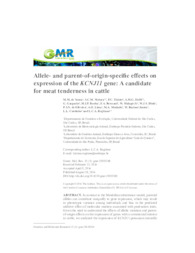Allele- and parent-of-origin-specific effects on expression of the KCNJ11 gene: a candidate for meat tenderness in cattle.
Allele- and parent-of-origin-specific effects on expression of the KCNJ11 gene: a candidate for meat tenderness in cattle.
Autoria: SOUZA, M. M. de; NICIURA, S. C. M.; TIZIOTO, P. C.; IBELLI, A. M. G.; GASPARIN, G.; ROCHA, M. I. P.; DONATONI, F. A. B.; MALAGO JUNIOR, W.; DINIZ, W. J. S.; OLIVEIRA, P. S. N. de; LIMA, A. O.; MUDADU, M. de A.; BARIONI JUNIOR, W.; COUTINHO, L. L.; REGITANO, L. C. de A.
Resumo: In contrast to the Mendelian inheritance model, parental alleles can contribute unequally to gene expression, which may result in phenotypic variance among individuals and bias in the predicted additive effect of molecular markers associated with production traits. Given the need to understand the effects of allelic variation and parent-of-origin effects on the expression of genes with a commercial interest in cattle, we analyzed the expression of KCNJ11 (potassium inwardly rectifying channel, subfamily J, member 11), which was previously described as a functional candidate gene for meat tenderness. Allele-specific and parent-of-origin-dependent expression of this gene were assessed in bovine muscle using the rs379610823 single nucleotide polymorphism as a reference. Biallelic expression was observed; however, the T allele was expressed at significantly higher levels than the C allele. Furthermore, increased expression of KCNJ11 was found in animals harboring the maternal T allele. This study is the first to describe the differential allelic expression of bovine KCNJ11. Our findings are important for understanding the mechanisms that underlie the pattern of KCNJ11 expression and its potential impact on the phenotypic variation of meat tenderness in Nelore beef cattle. This reinforces the need for further investigation of allelic- and parent-of-origin expression deviation in genetic markers eligible for the selection of target traits.
Ano de publicação: 2016
Tipo de publicação: Artigo de periódico
Unidade: Embrapa Pecuária Sudeste
Observações
1 - Por padrão são exibidas publicações dos últimos 20 anos. Para encontrar publicações mais antigas, configure o filtro ano de publicação, colocando o ano a partir do qual você deseja encontrar publicações. O filtro está na coluna da esquerda na busca acima.
2 - Para ler algumas publicações da Embrapa (apenas as que estão em formato ePub), é necessário ter, no celular ou computador, um desses softwares gratuitos. Sistemas Android: Google Play Livros; IOS: iBooks; Windows e Linux: software Calibre.
Acesse outras publicações
Acesse a Base de Dados da Pesquisa Agropecuária (BDPA) para consultar o acervo completo das bibliotecas da Embrapa.

